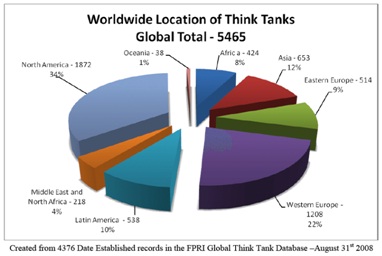Rediscovering a Sense of Purpose: the Challenge for Western Think-Tanks
If independent think-tanks work together around converging principles, then they can contribute to the emergence, for the first time, of an inclusive international society and, thus, confirm their normative as well as practical value, writes ROBIN NIBLETT.
 A series of centenary anniversaries for some of the original think- tanks, as well as increasing turbulence in domestic and international affairs, makes this a propitious time to review the role of think-tanks in helping to build a sustainably secure, prosperous and just world.
A series of centenary anniversaries for some of the original think- tanks, as well as increasing turbulence in domestic and international affairs, makes this a propitious time to review the role of think-tanks in helping to build a sustainably secure, prosperous and just world.
Today, western think-tanks, in particular, face a number of challenges to their relevance and credibility. It remains to be seen whether they can rediscover a sense of purpose that is fit for the twenty-first century, at a time when the pillars of the western-led international order that mobilized their counterparts early in the twentieth century are eroding.
To do so, I propose five practical steps that all think-tanks can take to adapt to these demands and challenges. I also suggest a set of principles that both western think-tanks and their counterparts in other parts of the world should commit to if they want to work together to promote the sort of peaceful and cooperative world that lies at the core of their stated missions.
At heart, leading think-tanks must consider whether it suffices to try to remain sources of objective debate and analysis, or if it is time, once again, for them to adopt a more proactive stance, being explicit about the principles that they believe should underpin peace and prosperity.
If independent think-tanks work together around converging principles, then they can contribute to the emergence, for the first time, of an inclusive international society and, thus, confirm their normative as well as practical value.
[Courtesy: https://www.chathamhouse.org/publication/ia/]

